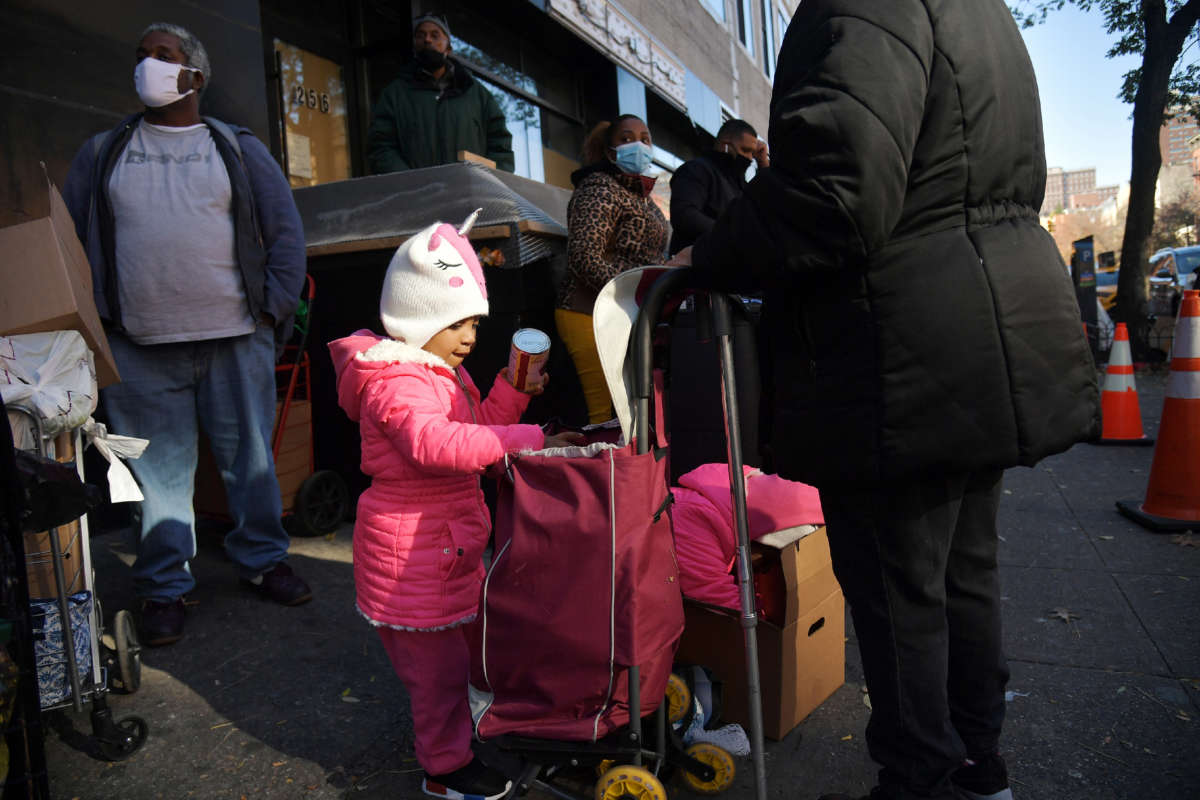The United States is slowly emerging from the COVID-19 economic recession. The unemployment rate has dropped by more than half. People are spending more money now than they did before the pandemic began. Families are paying off their credit card debt again.
Yet these milestones mask an uncomfortable truth: The economic recovery is mostly benefitting white families. New data released by the Census Bureau shows that nearly four in 10 Latino and Black households are having a hard time paying their bills more than a year into the pandemic — double the share of white households, according to the Center for Public Integrity’s analysis of the latest Household Pulse Survey, which covers the last two weeks of April.
About 36% of Latino families said they had a very difficult or somewhat difficult time paying their bills in the previous week, compared with 35% of Black families, 20% of Asian families and 18% of white families.
While these numbers reflect an improvement from previous months, the persistent racial gaps highlight the limits of government aid programs, said Carmen Sanchez Cumming, a research assistant at the Washington Center for Equitable Growth. For one, they don’t address job segregation.
“An important driver of these disparities is that Black and Latinx workers are more likely to be in occupations that have been especially hard hit,” said Sanchez Cumming, whose research has focused on racial inequality in the pandemic economy.
A large number of Black and Latino workers make a living in the leisure and hospitality industry, which has shed nearly 3 million jobs since the pandemic started. Those who didn’t lose their restaurant and hotel jobs often experienced steep pay cuts or saw their work hours reduced. The lost income is one reason so many people of color are struggling to pay their bills, said Sanchez Cumming. Her own research shows that Black women have faced the most challenges.
Congress has spent trillions of dollars to boost the safety net during the slowdown. Lawmakers increased spending on unemployment assistance, handed out stimulus payments and expanded child tax credits. But these policies weren’t designed to reverse decades of structural inequality.
For example, Black and Latino workers were more likely to lose their jobs during the pandemic, but they were also less likely to qualify for unemployment aid because many live in states that have made it harder to access the benefit. Even so, Sanchez Cumming said the economic relief programs have helped and the new survey data shows they’re still needed.
Rep. Gwen Moore (D-WI) made a similar argument during a March hearing before the House Budget Committee.
“Those who were behind before this pandemic have suffered disproportionately,” Moore told her colleagues. She pointed out that the Child Tax Credit lifted 4.3 million people out of poverty in 2018. In March, Congress passed the American Rescue Plan Act, which temporarily doubled the amount of money low-income families can claim per child. Economists say the temporary changes will help reduce poverty among Black families by 42%.
Moore urged her colleagues to make these changes permanent and to target the families that need the most support.
“We should keep doing what is working and build on the [American Rescue Plan] to begin a new conversation about how we help people truly escape poverty,” she said.
We’re not backing down in the face of Trump’s threats.
As Donald Trump is inaugurated a second time, independent media organizations are faced with urgent mandates: Tell the truth more loudly than ever before. Do that work even as our standard modes of distribution (such as social media platforms) are being manipulated and curtailed by forces of fascist repression and ruthless capitalism. Do that work even as journalism and journalists face targeted attacks, including from the government itself. And do that work in community, never forgetting that we’re not shouting into a faceless void – we’re reaching out to real people amid a life-threatening political climate.
Our task is formidable, and it requires us to ground ourselves in our principles, remind ourselves of our utility, dig in and commit.
As a dizzying number of corporate news organizations – either through need or greed – rush to implement new ways to further monetize their content, and others acquiesce to Trump’s wishes, now is a time for movement media-makers to double down on community-first models.
At Truthout, we are reaffirming our commitments on this front: We won’t run ads or have a paywall because we believe that everyone should have access to information, and that access should exist without barriers and free of distractions from craven corporate interests. We recognize the implications for democracy when information-seekers click a link only to find the article trapped behind a paywall or buried on a page with dozens of invasive ads. The laws of capitalism dictate an unending increase in monetization, and much of the media simply follows those laws. Truthout and many of our peers are dedicating ourselves to following other paths – a commitment which feels vital in a moment when corporations are evermore overtly embedded in government.
Over 80 percent of Truthout‘s funding comes from small individual donations from our community of readers, and the remaining 20 percent comes from a handful of social justice-oriented foundations. Over a third of our total budget is supported by recurring monthly donors, many of whom give because they want to help us keep Truthout barrier-free for everyone.
You can help by giving today. Whether you can make a small monthly donation or a larger gift, Truthout only works with your support.
